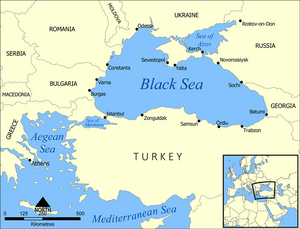Mangalia Romania

Mangalia is a city and a port on the coast of the Black Sea in the south-east of Constanţa County, Romania.
Variants of name
- Callatis (Anabasis by Arrian, p. 354.)
- Callatis (Greek: Καλλατις) (Pliny.vi.39)
- Callatian = A man of Callatis (Arrian: The Anabasis of Alexander, 6.23)
- Pangalia
- Panglicara
- Tomisovara
Jat Gotras Namesake
- Mangla = Mangalia = Callatis/Callatian (Anabasis by Arrian, p. 354.)
- Pangal = Pangalia = Callatis/Callatian (Anabasis by Arrian, p. 354.)
Jat Gotras Namesake
- Mangla = Mangalia = Callatis/Callatian (Greek: Καλλατις) (Pliny.vi.39)
- Pangal = Pangalia = Callatis/Callatian (Greek: Καλλατις) (Pliny.vi.39)
History
A Greek colony named Callatis was founded in the 6th century BC by the city of Heraclea Pontica.[1]
Its first silver coinage was minted approximately 350 BC. In 72 BC,
Callatis was conquered by the Roman general Lucullus and was assigned to the Roman province of Moesia Inferior.
Throughout the 2nd century AD, the city built defensive fortifications and the minting of coinage under the Roman emperors Septimius Severus and Caracalla continued. Callatis suffered multiple invasions in the 3rd century AD but recovered in the 4th century AD to regain its status as an important trade hub and port city.[2]
From 7th to 11th century the city was under the rule of the First Bulgarian Empire.
From the 9th century it was known by the Turks as Pangalia, by the Romanians as Tomisovara, and by the Greeks as Panglicara, and it was one of the most important ports on the west coast of the Black Sea.
Mangalia is the oldest continuously inhabited city on the present territory of Romania.
Ch.23 March through the desert of Gadrosia p.353-354
Arrian[3] writes.... THENCE Alexander marched through the land of the Gadrosians, by a difficult route, which was also destitute of provisions; and in many places there was no water for the army. Moreover they were compelled to march most of the way by night, and a great distance from the sea. However he was very desirous of coming to the part of the country along the sea, both to see what harbours were there, and to make what preparations he could on his march for the fleet, either by employing his men in digging wells, or by making arrangements somewhere for a market and anchorage. But the part of the country of the Gadrosians near the sea was entirely desert. He therefore sent Thoas, son of Mandrodorus, with a few horsemen down to the sea, to reconnoitre and see if there happened to be any haven anywhere near, or whether there was water or any other of the necessaries of life not far from the sea. This man returned and reported that he found some fishermen upon the shore living in stifling huts, which were made by putting together mussel-shells, and the back-bones of fishes were used to form the roofs.1 He also said that these fishermen used little water, obtaining it with difficulty by scraping away the gravel, and that what they got was not at all fresh. When Alexander reached a certain place in Gadrosia, where corn was more abundant, he seized it and placed it upon the beasts of burden; and marking it with his own seal, he ordered it to be conveyed down to the sea. But while he was marching to the halting stage nearest to the sea, the soldiers paying little regard to the seal, the guards made use of the corn themselves, and gave a share of it to those who were especially pinched with hunger. To such a degree were they overcome by their misery that after mature deliberation they resolved to take account of the visible and already impending destruction rather than the danger of incurring the king’s wrath, which was not before their eyes and still remote. When Alexander ascertained the necessity which constrained them so to act, he pardoned those who had done the deed. He himself hastened forward to collect from the land all he could for victualing the army which was sailing round with the fleet; and sent Cretheus the Callatian 2 to convey the supplies to the coast. He also ordered the natives to grind as much corn as they could and convey it down from the interior of the country, together with dates3 and sheep for sale to the soldiers. Moreover he sent Telephus, one of the confidential Companions, down to another place on the coast with a small quantity of ground corn.
1. These people were called Ichthyophagi, or Fish-eaters. They are described by Arrian (Indica, 29); Curtius, ix. 40; Diodorus, xvii. 105; Pliny (Nat. Hist. vi. 25, 26); Plutarch (Alex. 66); Strabo, xv. They occupied the sea-ooast of Gadrosia, or Beloochistan. Cf. Alciphron (Epistolae, i. 1, 2).
2. A man of Callatis, a town on the Black Sea in Thrace, originally colonized by the Milesians.
3.Cf. Herodotus, i. 193.
External links
References
- ↑ Amphoras from Callatis (Romania), International Journal of Nautical Archaeology
- ↑ Michael Grant, "A Guide to the Ancient World", New York: Barnes and Noble Books 1997, p. 140
- ↑ The Anabasis of Alexander/6b, Ch.23
Back to Places

